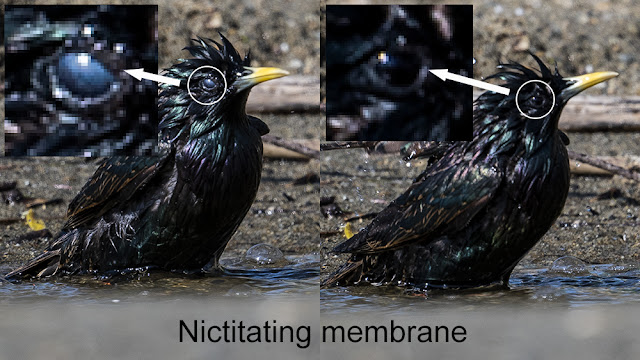Nictitating membranes
 |
| European Starling taking a bath - showing nictitating membrane on left frame. |
What do Vulcans and birds have in common? They both have nictitating membranes! The Vulcan reference comes from The Original Series show, Operation: Annihilate (Season 1, Episode 29) where Spock's blindness was temporary due to the protection from his inner eyelid, otherwise known as a nictitating membrane. It turns out that birds have this adaptive mechanism as well, although it is less about protecting the eye from too much light and more about just protecting the eye.
I was out paddling yesterday and found a starling bathing along the shoreline. I didn't get any photos of it that I liked, but I noticed that one of the images was vastly different from the others. In it, you can see that the eye has a translucent covering over it (left image). The other images showed the starling as one would normally see it, with the second eyelid open revealing the bird's eye (see right image).
It turns out that nictitating membranes are not unique to birds. Other vertebrates, including frogs, amphibians, and even some mammals have them. The word "nictitate" simply means to blink, which is exactly what the membrane does. It travels horizontally across the eye and provides moisture to keep the eye from drying out and helps to remove any foreign matter present. This is especially useful in birds while flying as the sweeping air can dry out the eyes quickly.
For example, peregrine falcons can dive at speeds over 350 km/hr and keep their nictitating membranes closed while in such a maneuver. In the starling above, the nictitating membranes are translucent, while in birds of prey such as eagles, it is transparent and allows them to see while pursuing prey.
Although I have thousands of photographs of birds, I have almost none showing the nictitating membrane. It was awesome to capture this one image and I was glad to have another to compare it to. I write most of my blogs as a means of showing my photos and sometimes just to be silly. Others, like this one, I write because there is some interesting fact I think others would be interested in. I hope you enjoyed it.
Thanks for reading.
Eric Svendsen www.ericspix.com



Comments
Post a Comment